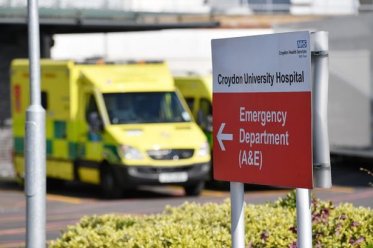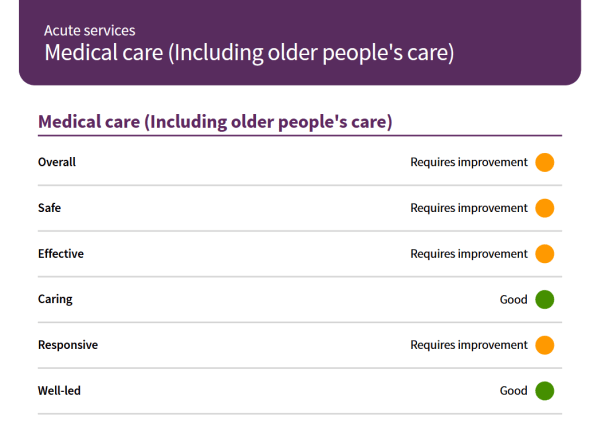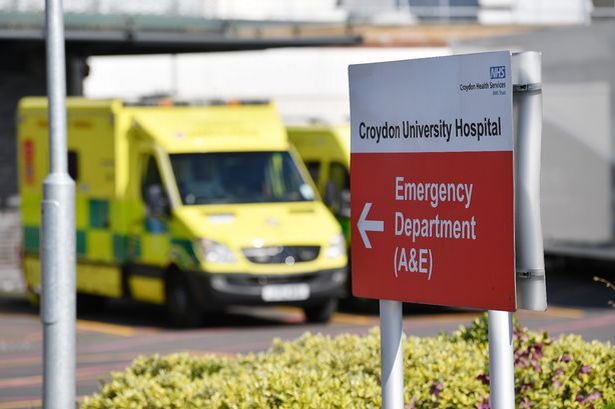Croydon’s largest NHS hospital has for the second time in less than three years been given a “requires improvement” rating by inspectors from the Care Quality Commission.
In the report, the inspectors found that some patients had to wait more than 60 hours – two-and-a-half days – to get transferred to a bed on a ward.

Long waits: it can take up to 60 hours to find a ward bed for patients from Croydon’s A&E, according to inspectors
The CQC says that the average wait for a bed at Mayday was 13 hours – seven hours longer than the national average.
In a statement issued ahead of the publication of the inspectors’ report, the CQC described a hospital that is badly overcrowded, with poor systems in place for the safe discharge of some patients.
“Staff had to care for many people in areas such as corridors… these spaces gave people little privacy and dignity and lacked facilities… These spaces also lacked call bells or emergency alarms… and some busy corridors made it hard for staff to reach vital areas like the resuscitation room.
“While it hadn’t done so yet, this could delay lifesaving care.”
The inspection at Croydon University Hospital in Thornton Heath took place in April, when the CQC looked at medical care (including older people’s care) and urgent and emergency services. It was the first such inspection at Mayday since December 2022.
“CQC carried out an inspection of these two services, in part to follow up on improvements CQC told the trust to make at their previous inspection and as part of our ongoing assessment of the services provided,” the CQC explained in a statement.
“CQC has rated how safe, effective and responsive medical care services are as ‘requires improvement’ again,” they said. Ratings for caring and well-led have gone from “requires improvement” to “good”.
“CQC has rated the trust’s urgent and emergency service ratings for safe, caring, responsive and well-led as ‘requires improvement’ again,” they say.

Nurses’ protest: insiders at Croydon University Hospital complain that the Trust is closing wards and refusing to offer jobs to this year’s cadre of student nurses
The hospital’s emergency services have been upgraded from “requires improvement” to “good” for effectiveness.
“The overall rating of Croydon University Hospital remains requires improvement,” the CQC says.
Croydon University Hospital is run by Croydon Health Services NHS Trust.
Antoinette Smith, CQC deputy director of operations for London, said: “When we inspected Croydon University Hospital, we found the emergency department was still very crowded, because of severe challenges admitting or discharging people from the medical wards, although staff were working extremely hard to meet people’s needs.
“Leaders understood the challenges they faced and were working on improvements, but these needed more time.
“People had long waits in the emergency department, waiting an average of over 13 hours in December 2024 for a bed on the wards, seven hours longer than the national average. Some people in the emergency department had to wait over 60 hours.
“Staff had to care for many people in areas such as corridors and an internal clinical waiting area. While people said staff were kind, these spaces gave people little privacy and dignity and lacked facilities such as adequate toilets.
“These spaces also lacked call bells or emergency alarms, though the trust was acting to manage this risk, and some busy corridors made it hard for staff to reach vital areas like the resuscitation room.
“While it hadn’t done so yet, this could delay lifesaving care.

Amber warnings: an extract from the CQC inspection report, showing areas requiring improvement at Mayday Hospital
“While emergency department waiting times are a national issue, individual hospitals must do everything possible to maintain people’s safety and dignity while working to reduce waits.
“Many people on the medical wards were waiting a long time to be discharged, because of delays in allocation of transport to get people home or pressures on the local health system, such as delayed care packages. Staff didn’t always plan from the start how people would be safely discharged after their treatment.
“We were reassured to see leaders had begun making improvements. The trust had also improved the staff culture since our last inspection, although this work was ongoing in some teams. As a result, most staff were working well together to meet people’s needs as well as they could.
“We’ve shared our findings with the trust so they know where there’s good practice to build on and where improvements must still be made. We’ll continue to monitor these services closely to ensure people receive safe care while these improvements are ongoing.”
According to the CQC, inspectors found:
- The emergency department lacked enough rooms to care for people with mental health needs safely while they waited for a place in other mental health services, which took over 16 hours on average.
- Most people who didn’t need an overnight bed were treated quickly at the Same Day Emergency Care unit. However, the unit was cramped and some people were sent to the emergency department when it closed at night whilst waiting for a bed on the wards.
- The medical wards didn’t always have the right skill mix of staff to meet people’s needs.
- There were some areas of non-clinical training which were below that required, especially for doctors.
- Inspectors didn’t always find evidence that staff always assessed or managed individual risks to people’s safety, such as their risk of falling or risks to people whose condition may be deteriorating.
- As the central monitoring system to warn staff about concerning vital signs wasn’t working effectively, staff in some medical wards were being asked to check on people every 30 minutes. This could slow staff’s response in an emergency. A new system was going to be put in place after this inspection and additional checks of vital signs undertaken.
- The hospital wasn’t always managing medicines well, to ensure people received them safely and they were always kept secure.
The inspectors say that they did find that hospital staff treated people with kindness and empathy.
The Trust’s new Frailty SDEC team, specialising in same-day emergency care for older people, was highly motivated and keen to take on more people from the emergency department.
The medical wards were clean and hygienic, and they say that the Trust was working well with other organisations in the local healthcare system to identify possible improvements.
The CQC says that its report will be published on its own website in the coming days.
Read more: Student nurses left ‘abandoned’ and ‘neglected’ by NHS Trust
- If you have a news story about life in or around Croydon, or want to publicise your residents’ association or business, or if you have a local event to promote, please email us with full details at inside.croydon@btinternet.com
 As featured on Google News Showcase
As featured on Google News Showcase
Like this:
Like Loading…
About insidecroydon
News, views and analysis about the people of Croydon, their lives and political times in the diverse and most-populated borough in London.
Based in Croydon and edited by Steven Downes. To contact us, please email inside.croydon@btinternet.com

